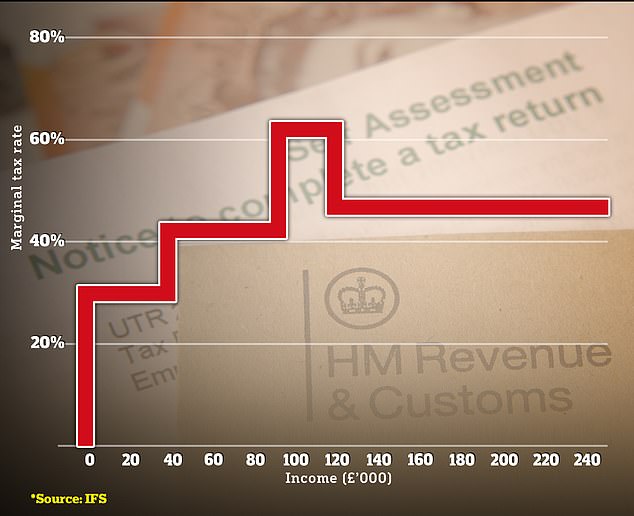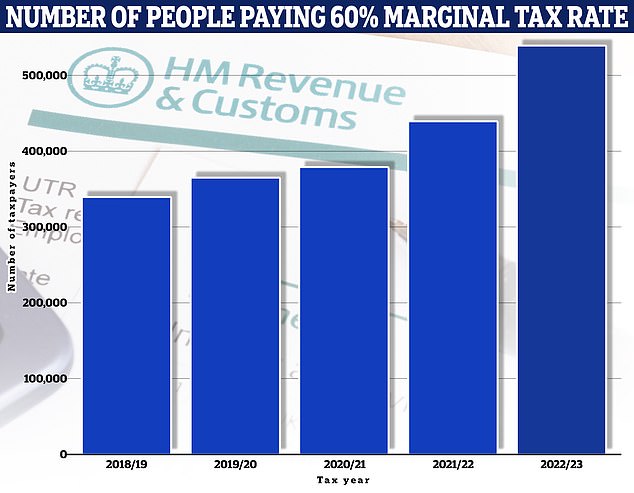Table of Contents
More than half a million people pay a marginal tax rate of 60 per cent on the next pound they earn.
More people than ever are being hit by the 60 per cent tax trap, which affects those earning between £100,000 and £125,150 a year, according to Bowmore Financial Planning.
While the official top rate of income tax is 45 per cent for incomes above £125,140, the removal of the personal allowance above £100,000 means an even higher marginal rate just below that figure.
This is because for every extra pound earned between £100,000 and £125,150, 50p is removed from the tax-free personal allowance, turning the top income tax rate from 40 per cent into 60 per cent.
The number of people paying a marginal tax rate above 60% is now half a million. Data source: Bowmore Financial Planning
While there are other cases where the removal of benefits interacts with earnings, such as the child benefit tax trap, the 60 per cent rate caused by the removal of the personal allowance is one that is built into the income tax system.
It creates a very high marginal tax rate, that is, the rate paid on the next pound earned.
This means that income tax rates start at 20 per cent, rise to 40 per cent, then peak at 60 per cent between £100,000 and £125,150, before falling again to 45 per cent above that level.
This means that while someone earning £100,000 would lose 60 per cent of a £5,000 pay rise to tax, someone earning £200,000 would only lose 45 per cent.

Tax traps: The chart above shows the marginal tax rates for income tax and national insurance, which rise to 62% for those earning between £100,000 and £125,150.
The number of taxpayers paying this higher rate has risen 23 percent in the past year, from 436,000 to 537,000, according to Bowmore, as inflation pushes up wages.
He has asked the Government to adopt “urgent measures to correct this inequality in the income tax system.”
Meanwhile, the number of taxpayers whose income has increased through the 60 percent tax loophole and has moved on to paying the additional 45 percent tax rate has also risen sharply.
Official figures show the number of additional taxpayers rose from 950,000 to 1.13 million in the past year.
This almost doubled the 587,000 paying the higher rate in 2022/23, after former Chancellor of the Exchequer Jeremy Hunt cut the 45% tax threshold from £150,000 to £125,140.
Scotland’s higher income tax rates make matters worse north of the border, where a 45 per cent peak tax rate applies above £75,000.
The fiscal assault from frozen thresholds
It’s not just those earning between £100,000 and £125,150 who are hit by higher taxes. The freezing of income tax thresholds combined with high inflation has created a massive tax dragnet.
Keeping the basic rate threshold at £12,570 would push a larger proportion of people’s income into the 20 per cent tax.
At the same time, the higher rate threshold of £50,270 has not changed since April 2021, while the additional rate threshold has been reduced to £125,140.
The £100,000 threshold at which the personal allowance starts to be phased out has not been changed since it was introduced 15 years ago. If it had risen in line with inflation, it would be £153,000.
HMRC figures show that 6.3 million people are paying 40 per cent tax this year, up from 6 million this year, and almost double the number who paid the highest rate of tax in 2010.
The Institute for Fiscal Studies expects 8.7 million people to pay higher or additional rates by 2028/29.
Mark Incledon, CEO of Bowmore Financial Planning, said: ‘Achieving a six-figure salary has long been an important goal for many people.
‘We all understand that this means paying more tax. Unfortunately, if HMRC takes 60p for every pound you earn over £100,000, the appeal of getting to that point is much more limited.
If HMRC takes 60p for every pound you earn over £100,000, the appeal of getting there is much more limited.
‘As rising costs of living erode the real value of wage increases, the incoming government must address the tax trap for higher earners.
“It only discourages people from working harder, being more productive and ultimately generating economic growth.”
It is not only high-income earners who are affected by frozen thresholds: retirees are also affected.
The number of state pensioners who pay income tax rose by 660,000 to 8.51 million.
This means that there are now almost 9 million people aged 65 or over paying income tax, compared with 4.9 million in 2010/2011.
While the triple lock on state pensions ensures they rise in line with inflation, earnings or 2.5 per cent, maintaining the freeze on the personal allowance means a pensioner receiving the full state pension of £11,500 a year and some private pension income is liable to pay income tax.
>> Do you pay 60% tax? Get in touch with us and tell us what you think about it by putting 60% tax in the subject line: editor@thisismoney.co.uk
SAVE MONEY, EARN MONEY

Boosting investment

Boosting investment
5.09% cash for Isa investors

Cash Isa at 5.17%

Cash Isa at 5.17%
Includes 0.88% bonus for one year

Free stock offer

Free stock offer
No account fees and free stock trading
5.78% savings
5.78% savings
You have 365 days’ notice

Fiber broadband

Fiber broadband
BT £50 Reward Card: £30.99 for 24 months
Affiliate links: If you purchase a product This is Money may earn a commission. These offers are chosen by our editorial team as we believe they are worth highlighting. This does not affect our editorial independence.
Some links in this article may be affiliate links. If you click on them we may earn a small commission. This helps us fund This Is Money and keep it free to use. We do not write articles to promote products. We do not allow any commercial relationships to affect our editorial independence.

